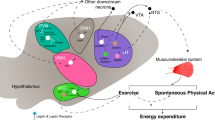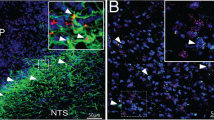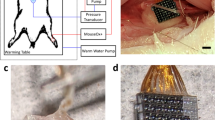Abstract
THE weight of adipose tissue is regulated by both hormonal and neural mechanisms1,2. The sympathetic nerve fibres which innervate adipose tissue3 enhance lipolysis when stimulated4,5. Denervation, on the other hand, slows the rate of fatty acid mobilisation during fasting6,7 and complete exclusion of the sympathetic nervous system is followed by an increase in weight8. The possibility that the medial or lateral hypothalamus (LH) is involved in modulating the sympathetic innervation to fat tissue has been suggested by the discovery that bilateral injury to the ventromedial hypothalamus (VMH) attenuated fatty acid mobilisation after stress9. If either of these hypothalamic areas were involved in regulating lipolysis, then unilateral denervation of the abdominal adipose tissue might produce effects qualitatively similar to unilateral hypothalamic injury. We have tested this hypothesis and report here that unilateral abdominal sympathectomy or an ipsilateral ventromedial hypothalamic lesion impairs lipolysis during fasting but that a lateral hypothalamic lesion is without effect.
This is a preview of subscription content, access via your institution
Access options
Subscribe to this journal
Receive 51 print issues and online access
$199.00 per year
only $3.90 per issue
Buy this article
- Purchase on Springer Link
- Instant access to full article PDF
Prices may be subject to local taxes which are calculated during checkout
Similar content being viewed by others
References
Assimacopolous-Jeannett, F. & Jeanrenaud, B. Clin. Endocr. Metab. 5, 337–365 (1976).
Bray, G. A. The Obese Patient (Saunders, Philadelphia, 1976).
Wirsen, C. Handbook of Physiology, Section 5 (American Physiological Society, Washington DC, 1965).
Correll, J. W. Science 140, 387–388 (1963).
Rosell, S. Acta physiol. scand. 67, 343–351 (1966).
Cantu, R. & Goodman, H. M. Am. J. Physiol. 214, 207–212 (1967).
Lefebvre, P., Luyclix, A. & Bacq, A. M. Regulation of Adipose Tissue Mass (Exceprta Medica, Amsterdam, 1974).
Cannon, W. B., Newton, H. F., Bright, E. M., Menkin, V. & Moore, R. M. Am. J. Physiol. 89, 84–107 (1929).
Nishizawa, T. & Bray, G. A. J. clin. Invest. 61, 714–721 (1978).
Powley, T. L. & Keesey, R. E. J. comp. Physiol. Psychol. 70, 25–36 (1970).
Dole, V. P. J. clin. Invest. 35, 150–154 (1956).
Ban, T. Pharmac. Biochem. Behav. 3, 3–13 (1975).
Lemonnier, D. J. clin. Invest. 51, 2907–2914 (1972).
Johnson, P. R., Zucker, L. M., Cruce, J. A. F. & Hirsch, J. J. Lipid Res. 12, 706–714 (1971).
Author information
Authors and Affiliations
Rights and permissions
About this article
Cite this article
BRAY, G., NISHIZAWA, Y. Ventromedial hypothalamus modulates fat mobilisation during fasting. Nature 274, 900–902 (1978). https://doi.org/10.1038/274900a0
Received:
Accepted:
Issue Date:
DOI: https://doi.org/10.1038/274900a0
This article is cited by
-
Increased metabolic rate and insulin sensitivity in male mice lacking the carcino-embryonic antigen-related cell adhesion molecule 2
Diabetologia (2012)
-
Hypothalamic Paraventricular Nucleus Lesion Involvement in the Sympathetic Control of Lipid Mobilization
Obesity (2010)
-
Pediatric Endocrine Disorders of Energy Balance
Reviews in Endocrine and Metabolic Disorders (2005)
-
Cardiovascular Vagosympathetic Activity in Rats with Ventromedial Hypothalamic Obesity
Obesity Research (2003)
-
Lipolytic responses induced by intracerebroventricular administration of histamine in the rat
Agents and Actions (1981)
Comments
By submitting a comment you agree to abide by our Terms and Community Guidelines. If you find something abusive or that does not comply with our terms or guidelines please flag it as inappropriate.



